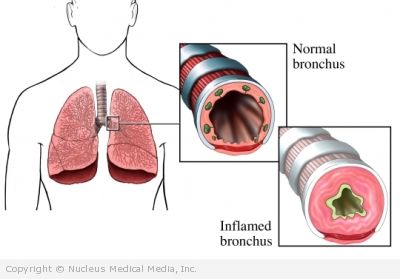Berylliosis
(Beryllium Disease)
Berylliosis – Definition
Berylliosis is an occupational lung disease. It occurs in people who work with beryllium. Berylliosis usually only occurs in people who have an allergic sensitivity to beryllium. This is about 2% of the US population.
Beryllium is a metallic element that is found in rocks, coal, soil, and volcanic dust. It is used in certain industries.
There are two types of berylliosis: acute and chronic.
Berylliosis – Causes
Berylliosis is caused by inhalation or other exposure (such as through an open skin wound) to beryllium dust or fumes.
Acute berylliosis is caused by brief exposure. It is very rare today. Chronic berylliosis is caused by long-term exposure. It is more common than acute, but still relatively unusual.
Berylliosis – Risk Factors
A risk factor is something that increases your chance of getting a disease or condition. The primary risk factor for berylliosis is working in an area where beryllium is processed. Industries that use beryllium include:
- Aerospace
- Electronics
- Fiber-optics
- Mining
- Nuclear weapons and reactors
- Laboratory technologies
- Dental alloy preparation
- Scrap metal
- Manufacturing of:
- Mirrors
- Golf clubs
- Microwaves
- Bicycle frames
Although the risk is extremely low, people who live near such industries have a slightly higher risk of getting berylliosis than those who do not.
Berylliosis – Symptoms
Symptoms of acute berylliosis come on suddenly and rapidly. The main symptoms are due to severe lung inflammation. These symptoms include:
- Coughing, possibly bringing up blood-tinged sputum
- Chest pain
- Shortness of breath
- Weight loss
Symptoms of chronic berylliosis develop slowly. Sometimes, symptoms may not appear until many years after exposure to beryllium. Chronic berylliosis produces two main pathologic changes:
- Scarring of the lung tissue
- Formation of granulomas (inflammatory masses) in the lungs (primarily) and other organs
In severe cases, berylliosis may lead to heart failure.
Symptoms of chronic berylliosis may include:
- Dry cough
- Weight loss
- Fatigue
- Chest pain
- Shortness of breath
Berylliosis – Diagnosis
The doctor will ask about your symptoms and medical history and perform a physical exam. Tests may include:
- Chest x-ray
- Pulmonary function tests (PFTs) — to assess your ability to breathe
- BeLPT (beryllium lymphocyte proliferation test) — a blood test that determines allergic sensitivity to beryllium
- Lung biopsy — to test lung tissue using a bronchoscope (a thin, lighted tube that is inserted into the airways) to remove the sample
Symptoms of chronic berylliosis may not appear until years after exposure. Therefore, all workers who may have been exposed to beryllium should have BeLPT tests, even if they have no symptoms.
Berylliosis – Treatment
The most important step in the management of berylliosis is to avoid further exposure to beryllium.
For acute berylliosis, you may be given corticosteroid medication, usually prednisone. This drug helps to reduce lung inflammation. When treated rapidly, most patients recover fully. But in extreme cases, if not treated rapidly, acute berylliosis can be fatal.
For chronic berylliosis, corticosteroids may be used if you develop symptoms of lung disease. However, these medications don’t reverse scarring that has already occurred in the lungs.
Berylliosis – Prevention
Avoiding or limiting exposure to beryllium is the best way to prevent berylliosis. To do so, do the following:
- Ensure good ventilation in work areas where there is beryllium dust or fumes.
- Wear a respirator when doing work that could result in high beryllium exposure.
- Avoid eating, drinking, or smoking in areas where beryllium is used.
- Do not wear street clothing when working with beryllium.
- After working with beryllium, shower and wash your hair before changing back into street clothing.
- If you are exposed to beryllium, consult with your doctor about the best way to proceed. You may need to have a BeLPT blood test as well as PFTs to detect any change in lung function.


